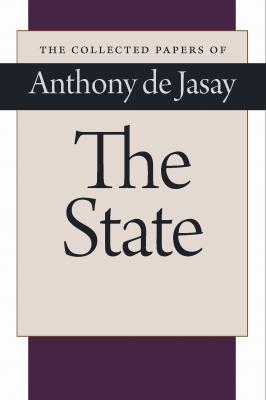The State. Anthony de Jasay
Читать онлайн.| Название | The State |
|---|---|
| Автор произведения | Anthony de Jasay |
| Жанр | Юриспруденция, право |
| Серия | The Collected Papers of Anthony de Jasay |
| Издательство | Юриспруденция, право |
| Год выпуска | 0 |
| isbn | 9781614872191 |
THE STATE
This book is published by Liberty Fund, Inc., a foundation established to encourage study of the ideal of a society of free and responsible individuals.
The cuneiform inscription that serves as our logo and as a design element in Liberty Fund books is the earliest-known written appearance of the word “freedom” (amagi), or “liberty.” It is taken from a clay document written about 2300 B.C. in the Sumerian city-state of Lagash.
© 1998 by Liberty Fund, Inc. Originally published in 1985 by Basil Blackwell, Ltd.
This eBook edition published in 2013.
eBook ISBNs:
978-1-61487-101-9
978-1-61487-219-1
Contents
Violence, Obedience, Preference
The Contours of the Minimal State
If States Did Not Exist, Should They Be Invented?
Inventing the State: The Social Contract
Inventing the State: The Instrument of Class Rule
Closing the Loop by False Consciousness
Repression, Legitimacy and Consent
The Revealed Preference of Governments
Unintended Effects of Producing Interpersonal Utility and Justice
How Justice Overrides Contracts
Though this book leans on political philosophy, economics, and history, it leans on each lightly enough to remain accessible to the educated general reader, for whom it is mainly intended. Its central theme—how state and society interact to disappoint and render each other miserable—may concern a rather wide public among both governors and governed. Most of the arguments are straightforward enough not to require for their exposition the rigour and the technical apparatus that only academic audiences can be expected to endure, let alone to enjoy.
If nothing else, the vastness of the subject and my somewhat unusual approach to it will ensure that specialist readers find many parts of the reasoning in need of elaboration, refinement, or refutation. This is all to the good, for even if I wanted to, I could not hide that my object has been neither to provide a definitive statement nor to solicit the widest possible agreement.
The reader and I both owe a debt to I. M. D. Little for scrutinizing the major part of the original draft. It is not his fault if I persevered in some of my errors.
Paluel
Seine Maritime
France
1997
The State is about the intrinsic nature of political power, constant in the face of changing contingencies, dictating the way forms of government evolve, rather than being dictated by them.
The logic of using political power is the same as the logic of making choices in any other field of endeavour. Rational beings have objectives they seek to attain,
